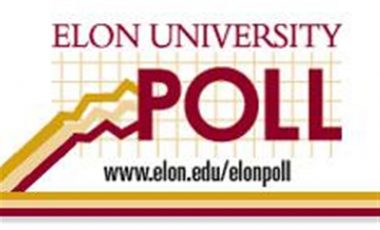North Carolina residents identified gas prices and public transportation as the chief transportation concerns facing the state, according to the latest Elon University Poll. Respondents say they are receptive to establishing new methods of transportation, such as railways, yet displayed opposition to most funding methods.
 The poll, conducted March 10-13, 2008, by the Elon University Institute for Politics and Public Affairs, surveyed 473 North Carolina residents. The poll has a margin of error of 4.5 percent.
The poll, conducted March 10-13, 2008, by the Elon University Institute for Politics and Public Affairs, surveyed 473 North Carolina residents. The poll has a margin of error of 4.5 percent.
The leading statewide transportation issues, as identified by poll respondents, include:
Price of gas: 31 percent
Public transportation: 17 percent
Road conditions: 13 percent
Traffic congestion: 10 percent
Improving public transportation services and widening existing roads were named the most effective means of dealing with congestion, and both alternatives were supported by more than four out of every five respondents. However, a majority of respondents opposed the increase of parking fees and highway tolls to combat congestion, with roughly two thirds of respondents indicating their displeasure to both ideas.
“State officials should find some comfort in these results as it appears that citizens share their concerns about the state’s transportation woes,” said Hunter Bacot, director of the Elon University Poll. “Citizens also appear willing to do their share in meeting this challenge given their support of options that can improve transportation in the state.”
Potential new railway options were embraced positively by those surveyed. Commuter rails in urban areas and high-speed train travel between larger cities were supported or strongly supported at 72 and 70 percent of respondents respectively. Respondents also embraced the possibility of a regional rail system in their area, with 65 percent supporting or strongly supporting this concept.
In fact, 26 percent of those in favor of paying extra fees for rail services reported that they would be willing to pay $75 or more annually to fund such a system.
While respondents appeared willing to support railway services financially, there was general opposition to transportation funding in the areas of road construction and maintenance. Proposed taxes on motor fuel, local property taxes and any state levied taxes on property or fuel were all opposed or strongly opposed by more than 70 percent of those surveyed.
Respondents instead favored special fees on developers (59 percent) or weight fees on trucks (59 percent) to offset those costs.
Despite varying opinions on the appropriate methods to fund transportation projects, some options received substantial support from citizens. Sixty-six percent of those surveyed supported or strongly supported a $2 billion dollar statewide bond referendum to fund work on projects such as bridges, roads, and other transportation projects. Respondents also expressed support for giving local governments the option to pay for transportation projects using a local half-cent sales tax.
Residents have embraced few methods of commuting, largely because they report a lack of available options. A majority of respondents would consider using:
Car pools: 61 percent
Trains: 59 percent
Light rail: 58 percent
HOV lanes: 55 percent
Buses: 53 percent
The North Carolina Department of Transportation is regarded highly among residents. Sixty-one percent of respondents said they are satisfied or strongly satisfied with the overall performance of the department. Across a host of specific responsibilities, the department fared well with the exception of:
Road maintenance: 45 percent very unsatisfied/unsatisfied
Public transit provision: 42 percent very unsatisfied/unsatisfied
Road construction: 40 percent very unsatisfied/unsatisfied
Eighty-three percent of poll respondents who have contacted the department said they interacted with a respectful and courteous staff member, and 80 percent reported dealing with someone who was knowledgeable and helpful.


